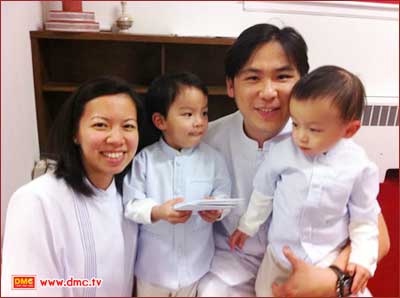The Heart of the Family#2
Dhamma for Laypersons: the Heart of a Stable Family
Dhamma for Laypersons: the Heart of a Stable Family
When a person thinks a bout selecting a spouse, or thinks about getting married and having a family, one must prepare oneself because nobody can avoid the four Problems previously mentioned.
Although the solution is not simple, that does not mean there is no path to correct and prevent them from occurring. If each person realizes what the heart of the family is and everyone takes the best possible care of the family’s heart, the problems will be resolved in the end.
The Lord Buddha gave a Dhamma discourse pertaining to a method that can be utilized as a basis for daily life and a means of establishing a stable family. It is known as “Dhamma for Laypersons.” Composed of four parts, it is considered to be the heart of a stable family:
1. Truthfulness or sacca
2. Self-control or dama
3. Endurance or khanti
4. Sacrifice or caga
In general, if our hearts are still beating, then we are still alive. But whenever family members possess Dhamma for Laypersons, then the family’s heart will continue to beat as well. All the aforementioned problems will not happen at all. There will only be a stable family with warmth and harmony that will increase with each passing day.
Composed of four parts, what is the importance of Dhamma for Laypersons? How does it guide a family to correct and prevent daily family dilemmas?
The Lord Buddha illustrated the answers, which are as follows:
1) Truthfulness or sacca will solve the problem of suspicion.
Sacca means truthfulness, sincerity and a strong sense of trust towards each other.
If these words are expressed in this way, some people may not understand the concept clearly. However, if the concept is explained in a way that allows people to put it into practice, truthfulness means responsibility or the act of being responsible.
In analyzing how a family operates, each member’s sense of responsibility is the most important element. If a family member lacks responsibility, then suspicion among family members will be the immediate result. By the same token, if a person wants to get married, the first characteristic that should be evaluated is the potential spouse’s sense of responsibility. The bride and the groom both must recognize if the other is responsible enough to experience a family’s life, death, success, and failures.
As our truthfulness can be seen in these four ways, the more we possess, the more responsibility we have.
A person who is truthful is truthful exhibits responsibility in these four ways:
1.1) Responsibility in duty and work. This means, no matter what the work is, the amount of work, its ease or difficulty, whether or not the situation is favorable, whether or not the budget is limited, whether or not one has limited assistance, limited time, or limited knowledge, even with all of there factors, a person who is truthful always completing the task and doing so to the best of his/her ability.
1.2) Responsibility in speect. This means that one’s speech must match one’s actions and one’s actions must match one’s speech. It is irresponsible for a person to say s/he did a foot, if that person really did an inch. It is irresponsible for a person to say that he/she did more than a foot, if that person did less than that. One’s actions should always be described truthfully in words.
1.3) Responsibility in how friends are made. Friends should be made with sincerity and without hidden agendas. Whatever one must say or whatever warning one must give to a friend, one must be straightforward. One must be sincere. And most importantly, one must not be biased or prejudiced in any of the following four ways: biased because of love, biased because of hatred, biased because of stupidity, or biased because of fear.
1.4) Responsibility in goodness and moral standards. This means that a person should have Dhamma as his/her foundation. As such, this person will not want to do something that is wrong, that would go against the Precepts, against Dhamma, against the culture, or against the laws of the country. Demonstrating this responsibility will prevent a person from going to prison and Hell, and will open Heaven’s door to that person.
Therefore, when this information is analyzed in this fashion, a person who has truthfulness is responsible in his/her work, speech, choice of friend, and has moral principles. Thus, that person thinks, speaks, and acts with sincerity and good intentions so everything is done in the best possible way. This is a way to elevate one’s know ledge and ability, and to bring out one’s best persona continually.
As our truthfulness can be seen in these four ways, the more we possess, the more responsibility we have. These kind of people can maintain this simple foundation constantly in their minds. Whatever they do, they will do it to the best of their ability; whatever they say, they will say it as clearly as possible; and their minds will have the most steady moral foundation as possible.
A truthful person is not only a trustworthy person in the family but is trustworthy with friends as well. The suspicion that friends may have of that person from the past will decrease. But if a person is not truthful, that person will always be greeted with suspicion and distrust. Good people will escape and avoid involvement with this distrustful person. Good people will not want to befriend dishonest people because they do not want to gain a bad reputation through association.
So if a person in a family does not have truthfulness or a sense of responsibility towards work, speech, personal relationships, goodness and morality, the problem of suspicion will develop. Then how can they live together?
Thus, for a family to have a strong foundation, family members must have truthfulness or sacca as the first habit.
Meditation - Related Articles
" />
" />
" />
" />
" />
" />
" />
" />
" />
" />
" />
" />







